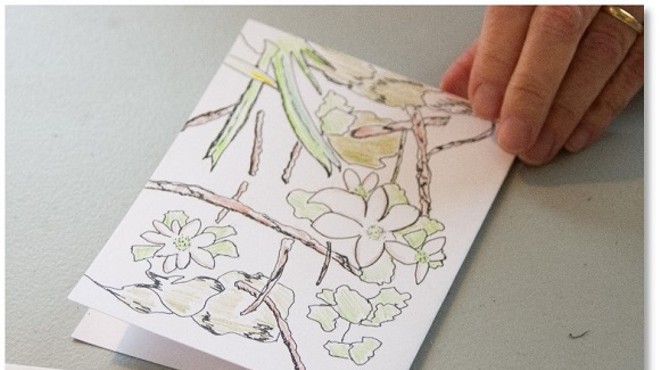Although you may work in a very respectable profession, it is also likely that at some point you have been a hooker. No, no, not in the street-walking sense, but on the energetic and emotional plane. “Hooking” is a phenomenon in which a line of energy is cast from one person into another person’s space where, like a fishhook, it attaches firmly into the solar plexus and/or other energy centers of the body. When someone hooks you, it feels like a tug in your center or on your entire being. Sometimes being hooked feels nice, such as when someone is charming the pants off of you. Other times it feels awful, such as when someone lays a guilt trip on you. And when you seduce, guilt trip, or otherwise manipulate others, you become the hooker.
Some people hook others intentionally, but it mostly occurs with little or no awareness. Hooking, at its worst, is initiated from insecurity or neediness, and plugs right into those same aspects of others. Very insecure people who are skilled at hooking will instinctively sense another’s weaknesses, find the “holes” in another’s aura (energetic field), and attempt to “latch on” in order to boost their self-esteem. Competitive people can hook with a piercing glance or remark that deflates the hookee and evokes a state of insecurity and self-doubt. Think of the cinematic portrayals of a powerful older matron putting an ingénue “in her place” (recent example: The Meryl Streep/Anne Hathaway relationship in The Devil Wears Prada). Beauty magazines and advertisements often hook us by preying on our diminished sense of self.
Here are some examples of hooking scenarios and the effects they can have:
Hooked with Guilt A young man brings his girlfriend home for a holiday. He reveals that they won’t be staying overnight as they have a plane to catch; he is taking her away for the weekend. His mother, who was expecting otherwise, implies that without the son’s presence, his ailing father and nephews will suffer. Despite feeling guilty, the couple leaves as planned—but bicker the entire time, in the aftermath of the hooking.
Hooked with Enchantment At an empowerment retreat, several distinguished and married women are mysteriously transformed into panting puppies around the charismatic leader. The leader had hooked them by adorning each one with personal attention, penetrating them with his insights, and creating a feeling of intimacy.
Hooked by Jealousy/Competition A junior executive presents an idea to the board and it is very well received. The executive’s boss offers congratulations, but, considering the firm’s recent budgetary limitations, sympathetically adds, “Ugh, the timing—you know it’s not going anywhere, right?” The junior executive resumes the day with a gnawing feeling of failure.
Hooked through Sexual Energy A woman walks into a bar, scans the crowd, zeroes in on a target, and moves toward him. She gazes seductively, smiles briefly, and orders a drink. As if on cue, he offers to pay for it. They eventually go home together. Three weeks later, he moves in with her.
Sexual hooking is a very popular way to reel in the opposite sex. When someone hooks you sexually, it can feel like an electric charge running through your body, inciting a sense of urgency. Sexual hooking can eventually lead to meaningful relationships, albeit ones that are often laced with lots of drama and possessiveness. But there is a difference between being hooked on someone and forming a healthy attachment to them. Being hooked on someone is experienced as a desperate need for the other in order to survive, and a belief that all happiness comes from the other. By contrast, building a healthy attachment involves two whole parties who derive pleasure from each other’s company, and come to depend on one another while creating a relationship based on similar values, true affinity, and the choice to love each other.
Why is it important to be aware of hooking if it is happening all around us? Because it is very powerful. Sometimes it’s done intentionally, with good intent, such as when parents reward their children for behaviors they want (or don’t want) to see, or when concerned loved ones plan an intervention to “manipulate” a substance abuser into getting treatment. But when hooking occurs with underlying negative intent, even if done unconsciously, it knocks us off center, leaving us feeling obsessed, cloudy, or drained, and powerless. When we feel powerless we act out of alignment with our truest selves, which has an adverse impact on us and on those we love.
The good news is, you can’t be hooked unless there is a space in you that is available for it. If at the end of this past holiday season, for instance, you felt drained in ways that weren’t just a result of too much partying, and your energy field looks like a Christmas tree with everyone’s ornamental hooks still hanging from your branches, it may be time to get serious about building resistance to others’ hooks.
If you practice raising your awareness about where people hook you, and how you let them, you can create strength inside that leaves no place for the hooks to stick. Below are some tools to help you stay off the hook as you move through the new year:
Creativity
Creativity requires focus and inspiration: two forces that can aid in the defense against hooks. If you find yourself with people who hook you into feeling their negative energy, engage them in something creative. Pull out your guitar, open that coffee table photography book, or get them to help with cooking. This way you can be sociable while creatively engaged.
Real Fun
Hooks don’t stick well to people who are fully engaged in genuine fun. I recently watched a bunch of guys playing touch football. They said some really nasty things to each other in the spirit of competition (one even “dissed” another’s girlfriend!), but they seemed to recycle the effects of the blows back into the game. The more sober kind of fun works best, since using too much alcohol or other substances to avoid the blows of hooks can lead to depressive states that leave more room for hooks. Fun can also ease the aftermath of a hook that has found its mark. The couple described earlier, for example, who bickered during their weekend after being hooked by guilt, might have lightened and perhaps banished the effects by becoming fully engaged in learning how to water ski. Even making fun of their bickering might have helped.
“Right” Hook
Feeling punched in the stomach by the hostile hook of a supposed loved one? Punch them back with humor, directness, and honesty. I once, in reaction to being hooked, pulled an imaginary dart out from my heart, faced the perpetrator, and said with a penetrating smile, “I believe this belongs to you.” Expressing directly to the hooker how it feels, without blame or expectation of changing the other, is clean. Asking someone directly for what you want is clean. Both are great, hookless ways of communicating.
Imagination
Sit quietly and use your imagination to envision what your aura (energy field) might look like. Then, strengthen it with playful imagery, such as by imagining the area around you infused with protective blue or purple light, or envisioning your body in a coat of rubber armor that you put on when you interact with hookers. I like to practice something I playfully call “auric caulking”: imagining where the holes in my aura are that allow hooking energy in and then sealing them up. Practicing this on a regular basis really helps close off places where others can hook you.
In addition, if while reading this you had the creeping sensation of “Hmmm, I do that,” it might be time to do some soul searching. Without beating yourself up for being a shameless hooker, ask yourself honest questions like “What keeps me from directly expressing my disappointment or need to others?” and “What inside me gets threatened by another’s happiness or success?” The courage in asking these questions and heeding the answers can help free you from hooking others, and you’ll feel better about yourself.
And remember, regardless of who you hook or what hooks may come, love yourself no matter what.
Blair Glaser, MA, LCAT, RDT is a Multi-Dimensional Psychotherapist who lives in Woodstock and has a private practice in Woodstock and in New York City.
















